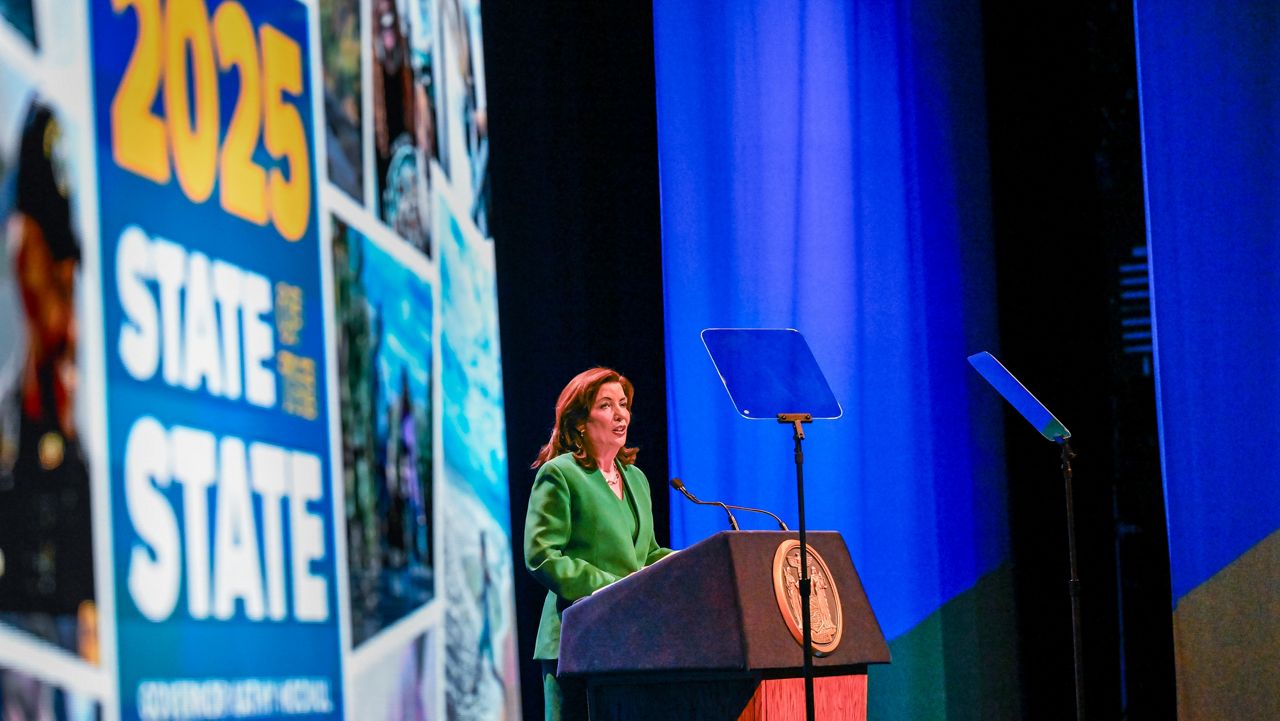Gov. Kathy Hochul is expected to announce Tuesday a budget that increases state spending by nearly $10 billion, offers tax cuts and backs a slate of affordability measures.
The fiscal year 2026-2027 state budget proposal is projected to grow to $252 billion in combined state and federal funding if approved by Hochul and the state Legislature.
It’s an increase from last year’s $239 billion enacted budget, which then increased to $243 billion in New York’s mid-year report, according to New York State budget Director Blake Washington.
“The budget is increasing largely based on current spending in Medicaid and in school aid. These commitments comprise probably 60% of the increase alone,” he said.
But Washington admitted the governor still doesn’t know how she’ll fill an estimated $33 billion hole in the MTA’s capital plan.
“The governor, the MTA and the legislature will have to figure out the size of the plan,” he said.
He said new taxes will have to be on the table. Hochul and lawmakers will need to negotiate a deal before the April 1 budget deadline.
“Once we know exactly what we are gaming for, [Hochul and the legislature will discuss] fees and taxes because it’s to support the lifeblood of the city economy,” Washington said.
Last June, lawmakers rejected an eleventh-hour deal presented by Hochul to approve another payroll mobility tax on businesses she said would help plug a hole in the MTA’s current capital plan after she paused the congestion pricing toll.
Fiscal watchdogs have cautioned Hochul and past governors about overspending instead of saving tax revenue in the state’s rainy-day fund, arguing future spending on programs could be jeopardized.
Although no new income taxes are on the table, Hochul plans on extending the current tax rate for those making a million dollars or more. Some in the legislature back an increase in the so-called "millionaire's tax" -- already the highest combined state and local tax rate in the country.
Washington said he has an eye on the new White House and how it could change spending projects.
“The federal government has to do a lot more for transit,” he said.
“We’re watching the real time executive orders coming out of Washington,” he said, adding that New York cannot sustain certain social services programs like the Supplemental Nutrition Assistance Program if federal aid is decreased.
Hochul is also slated to announce Tuesday a cellphone ban in public schools.
Schools statewide will be required to submit a plan detailing how they’ll comply. Washington said the state is budgeting $13.5 million to reimburse schools for costs associated with implementation.
The state won’t add any new funding to New York City’s migrant budget, despite Mayor Eric Adams’ request for additional dollars. The state already allocated $4.3 billion for housing, food and other programs, but City Hall has only spent a fraction of the amount.
Hochul’s plan also includes:
- Middle class tax cut for joint filers making $323,000 or less
- Childcare tax credit capped at $1,000
- A one-time “inflation refund” check: $300 for New Yorkers making $150,000 annually and $500 for joint filers making up to $300,000
- Free breakfast and lunch for public schoolers
“We have $5 billion being returned back to the people. How can we get resources back to the people feeling inflationary pressures?” he said, describing the proposal.
Hochul will also split the cost of NYPD overtime with New York City as part of a new program requiring two cops on each of the 150 trains that traverse the city between of 9 p.m. and 5 a.m.
That program started Monday and is on track to end in June, with the possibility of an extension at the governor’s discretion. The plan is slated to cost $154 million.
The overall budget package also includes money for City Hall’s signature “City of Yes” housing plan, spreading out Hochul’s $1 billion over the next several years.
Meanwhile, the state will increase its overall spending on schools and Medicaid, despite threatening to cut both programs last year.
Total school aid is projected to increase to $37.4 billion, representing a $1.5 billion boost, according to Washington.
With one in three New Yorkers relying on the state’s Medicaid program, total state spending will increase to $35.4 billion.
“Nobody wants to cut school aid, nobody wants to cut Medicaid. But you still have to try and live between your means,” Washington said.
“Medicaid has high utilization and high enrollment. Post-pandemic enrollment is high and managed long-term care enrollment is growing at a pretty fast clip as well,” he said.
Hochul is slated to give her budget address at 1 p.m. Tuesday in the State Capitol Building in Albany.


